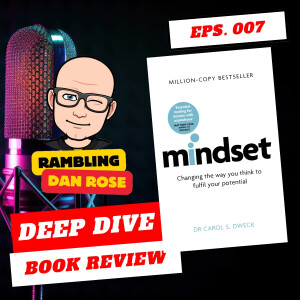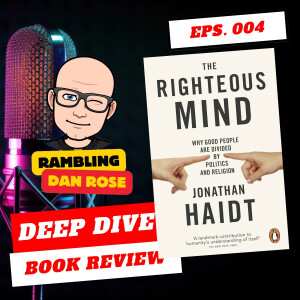Rambling Dan Rose Deep Dive Book Reviews
Dive into the world of insights and ideas with Rambling Dan Rose Deep Dive Book Reviews! We explore a wide range of topics through thoughtful, in-depth book reviews, offering inspiration, learning, and engaging conversations. Whether you’re here to expand your perspective or enjoy meaningful discussions, our content is crafted to inform and entertain. Join us as we unpack valuable insights on today’s most compelling subjects. Don’t forget to like and subscribe for updates on new content—thanks for stopping by!
Episodes

Thursday Dec 05, 2024
Thursday Dec 05, 2024
Today, our podcast review and commentary is from "Story Genius: How to Use Brain Science to Go Beyond Outlining and Write a Riveting Novel" by Lisa Cron. The book discusses the power of storytelling and how the human brain is wired to respond to compelling narratives. Cron argues that effective stories are not simply about plot points but rather focus on a character’s internal journey, exploring their desires, misbeliefs, and the consequences of their actions. Cron's book aims to equip writers with a blueprint for crafting successful narratives, utilizing techniques like backstory development, subplot construction, and understanding the significance of cause and effect. By analyzing the mechanics of storytelling through the lens of brain science, Cron provides a practical and insightful framework for writers to create engaging and thought-provoking novels.
We use AI to help create our podcast episodes, generating voices and initial scripts. We carefully craft each episode through specific prompting and editing to ensure it offers helpful, accurate insights based on books we've read or books recommended by our listeners. AI allows us to produce consistent, high-quality content more efficiently and frequently so we can focus on delivering valuable discussions to you.
We recognize that everyone will hold their own opinions about the books, authors, and topics we explore in our reviews. Our goal is to provide diverse opinions and viewpoints that contribute to a critical study of the issues being discussed.
Have a book you'd like us to review in our unique podcast style? Drop us a comment, and we’ll check it out!

Thursday Dec 05, 2024
Thursday Dec 05, 2024
Today, we review Leidy Klotz's Subtract, which explores the human tendency to favor addition over subtraction as a means of problem-solving and improving systems. Klotz uses numerous examples, ranging from Lego constructions and urban planning to societal structures and personal productivity, to illustrate how overlooking subtraction leads to missed opportunities for improvement and even harm. The book argues that a conscious focus on subtraction, combined with understanding its psychological and cultural underpinnings, can unlock significant positive change across various domains. Klotz examines the reasons behind this bias, including cognitive accessibility, cultural influences, and ingrained habits, and proposes strategies for cultivating a subtractive mindset. Ultimately, the work advocates for a more balanced approach, recognizing the power of both addition and subtraction in achieving progress.
We use AI to help create our podcast episodes, generating voices and initial scripts. We carefully craft each episode through specific prompting and editing to ensure it offers helpful, accurate insights based on books we've read or books recommended by our listeners. AI allows us to produce consistent, high-quality content more efficiently and frequently so we can focus on delivering valuable discussions to you.
We recognize that everyone will hold their own opinions about the books, authors, and topics we explore in our reviews. Our goal is to provide diverse opinions and viewpoints that contribute to a critical study of the issues being discussed.
Have a book you'd like us to review in our unique podcast style? Drop us a comment, and we’ll check it out!

Thursday Dec 05, 2024
Thursday Dec 05, 2024
Today, we review Jacob Mchangama's Free Speech: A History from Socrates to Social Media, which traces the evolution of free speech from ancient Greece to the modern digital age. The book examines various historical periods and cultures, highlighting both the triumphs and failures of free speech protections. Mchangama explores the tension between democratic and elitist models of free speech, analyzing the impact of technological advancements like the printing press and the internet. Finally, the text addresses contemporary challenges to free speech, including the rise of disinformation and the power of social media platforms.
We use AI to help create our podcast episodes, generating voices and initial scripts. We carefully craft each episode through specific prompting and editing to ensure it offers helpful, accurate insights based on books we've read or books recommended by our listeners. AI allows us to produce consistent, high-quality content more efficiently and frequently so we can focus on delivering valuable discussions to you.
We recognize that everyone will hold their own opinions about the books, authors, and topics we explore in our reviews. Our goal is to provide diverse opinions and viewpoints that contribute to a critical study of the issues being discussed.
Have a book you'd like us to review in our unique podcast style? Drop us a comment, and we’ll check it out!

Thursday Dec 05, 2024
Thursday Dec 05, 2024
Today, we review One Person One Vote by Nick Seabrook. Seabrook explores the history of gerrymandering in the United States, examining various instances from colonial times to the modern era. He focuses on specific gerrymandering cases, analyzing their legal challenges and impact on elections. Seabrook also discusses the evolution of legal interpretations surrounding gerrymandering and different types of gerrymandering, such as partisan, racial, and incumbent gerrymandering. Finally, the text considers various proposed reforms aimed at addressing the issue.We use AI to help create our podcast episodes, generating voices and initial scripts. We carefully craft each episode through specific prompting and editing to ensure it offers helpful, accurate insights based on books we've read or books recommended by our listeners. AI allows us to produce consistent, high-quality content more efficiently and frequently so we can focus on delivering valuable discussions to you.We recognize that everyone will hold their own opinions about the books, authors, and topics we explore in our reviews. Our goal is to provide diverse opinions and viewpoints that contribute to a critical study of the issues being discussed.Have a book you'd like us to review in our unique podcast style? Drop us a comment, and we’ll check it out!

Thursday Dec 05, 2024
Thursday Dec 05, 2024
We review Carol S. Dweck's book Mindset, which explores the impact of fixed versus growth mindsets on various aspects of life. Dweck contrasts a fixed mindset, where individuals believe their abilities are innate and unchangeable, with a growth mindset, where abilities are viewed as things that can be developed through effort and learning. Dweck uses numerous examples from various fields—education, sports, business, and relationships—to illustrate how these mindsets influence success, resilience, and personal well-being. It emphasizes the benefits of a growth mindset in fostering achievement, coping with challenges, and building strong relationships. The author also addresses common misconceptions about growth mindsets and offers practical strategies for cultivating a growth mindset.
We use AI to help create our podcast episodes, generating voices and initial scripts. We carefully craft each episode through specific prompting and editing to ensure it offers helpful, accurate insights based on books we've read or books recommended by our listeners. AI allows us to produce consistent, high-quality content more efficiently and frequently so we can focus on delivering valuable discussions to you.
We recognize that everyone will hold their own opinions about the books, authors, and topics we explore in our reviews. Our goal is to provide diverse opinions and viewpoints that contribute to a critical study of the issues being discussed.
Have a book you'd like us to review in our unique podcast style? Drop us a comment, and we’ll check it out!

Wednesday Dec 04, 2024
Wednesday Dec 04, 2024
We review Sidarta Ribeiro's Oracle of Night, which explores the history and science of dreams, tracing their significance across cultures and time. The book examines diverse perspectives on dreams, from ancient interpretations as prophecies and omens to modern scientific investigations into their neurological basis. Ribeiro discusses the role of dreams in various aspects of human life, including cultural practices, psychological development, and cognitive processes. He integrates insights from anthropology, psychology, neuroscience, and history to provide a comprehensive overview of dreams. The text further explores the relationship between dreaming and consciousness, memory, and mental health.
We use AI to help create our podcast episodes, generating voices and initial scripts. We carefully craft each episode through specific prompting and editing to ensure it offers helpful, accurate insights based on books we've read or books recommended by our listeners. AI allows us to produce consistent, high-quality content more efficiently and frequently so we can focus on delivering valuable discussions to you.
We recognize that everyone will hold their own opinions about the books, authors, and topics we explore in our reviews. Our goal is to provide diverse opinions and viewpoints that contribute to a critical study of the issues being discussed.
Have a book you'd like us to review in our unique podcast style? Drop us a comment, and we’ll check it out!

Wednesday Dec 04, 2024
Wednesday Dec 04, 2024
Our book today is Jonathan Haidt's The Righteous Mind, which explores the psychological basis of morality and its impact on political and religious divisions. Haidt argues that moral judgments are primarily driven by intuition ("the elephant"), rather than conscious reasoning ("the rider"), challenging the traditional rationalist view. He introduces the Moral Foundations Theory, proposing six fundamental moral intuitions (care/harm, fairness/cheating, loyalty/betrayal, authority/subversion, sanctity/degradation, liberty/oppression) that shape our moral judgments and political affiliations. The book further examines how group dynamics and the "hive switch" influence our behavior, explaining the persistence of seemingly irrational beliefs and the challenges of bridging moral divides. Finally, Haidt emphasizes the need for understanding diverse moral perspectives before making judgments.
We use AI to help create our podcast episodes, generating voices and initial scripts. We carefully craft each episode through specific prompting and editing to ensure it offers helpful, accurate insights based on books we've read or books recommended by our listeners. AI allows us to produce consistent, high-quality content more efficiently and frequently so we can focus on delivering valuable discussions to you.
We recognize that everyone will hold their own opinions about the books, authors, and topics we explore in our reviews. Our goal is to provide diverse opinions and viewpoints that contribute to a critical study of the issues being discussed.
Have a book you'd like us to review in our unique podcast style? Drop us a comment, and we’ll check it out!

Wednesday Dec 04, 2024
Wednesday Dec 04, 2024
Our review today is from Jason Stanley's How Fascism Works, which examines the mechanisms of fascist politics. Stanley uses historical examples, including the America First movement and Nazi Germany, to illustrate how fascists manipulate language, history, and social anxieties to consolidate power. He highlights the interconnectedness of fascist tactics, such as the creation of mythic pasts, the suppression of dissent, and the exploitation of anxieties around gender and race. The author emphasizes the importance of recognizing these tactics to counter the rise of fascism. Ultimately, the book serves as a warning against the dangers of fascist ideologies and their methods.
We use AI to help create our podcast episodes, generating voices and initial scripts. We carefully craft each episode through specific prompting and editing to ensure it offers helpful, accurate insights based on books we've read or books recommended by our listeners. AI allows us to produce consistent, high-quality content more efficiently and frequently so we can focus on delivering valuable discussions to you.
We recognize that everyone will hold their own opinions about the books, authors, and topics we explore in our reviews. Our goal is to provide diverse opinions and viewpoints that contribute to a critical study of the issues being discussed.
Have a book you'd like us to review in our unique podcast style? Drop us a comment, and we’ll check it out!

Wednesday Dec 04, 2024
Wednesday Dec 04, 2024
Today's review is of Jonah Goldberg's book Liberal Fascism, which argues that American liberalism shares significant historical and ideological roots with European fascism. Goldberg contends that Progressivism, the precursor to modern liberalism, exhibited totalitarian tendencies and a fondness for state control, exemplified by figures like Woodrow Wilson. He further suggests that the New Deal and the Great Society represent continuations of this trend, blurring the lines between the state and the individual. The author supports his thesis by exploring the overlapping beliefs of American progressives and European fascists regarding eugenics, social engineering, and the role of the state. Finally, Goldberg examines how these themes manifest in contemporary politics and culture, arguing that a "nice fascism" has taken root in the United States.
We use AI to help create our podcast episodes, generating voices and initial scripts. We carefully craft each episode through specific prompting and editing to ensure it offers helpful, accurate insights based on books we've read or books recommended by our listeners. AI allows us to produce consistent, high-quality content more efficiently and frequently so we can focus on delivering valuable discussions to you.
We recognize that everyone will hold their own opinions about the books, authors, and topics we explore in our reviews. Our goal is to provide diverse opinions and viewpoints that contribute to a critical study of the issues being discussed.
Have a book you'd like us to review in our unique podcast style? Drop us a comment, and we’ll check it out!

Wednesday Dec 04, 2024
Wednesday Dec 04, 2024
Our book today, Mick Hume's Trigger Warning: Is the Fear of Being Offensive Killing Free Speech, examines the erosion of free speech in Western societies. Hume argues that the increasing tendency to label speech as "offensive" or "harmful" is a form of censorship, often used to silence dissenting opinions rather than address genuine harm. He traces this trend across various contexts, including online interactions, university campuses, the media, and sports, showcasing how concerns about causing offense have become a tool to suppress debate and limit expression. Ultimately, the book advocates for a robust defense of unfettered free speech, even when it involves controversial or unpopular viewpoints.
We use AI to help create our podcast episodes, generating voices and initial scripts. We carefully craft each episode through specific prompting and editing to ensure it offers helpful, accurate insights based on books we've read or books recommended by our listeners. AI allows us to produce consistent, high-quality content more efficiently and frequently so we can focus on delivering valuable discussions to you.
We recognize that everyone will hold their own opinions about the books, authors, and topics we explore in our reviews. Our goal is to provide diverse opinions and viewpoints that contribute to a critical study of the issues being discussed.
Have a book you'd like us to review in our unique podcast style? Drop us a comment, and we’ll check it out!






